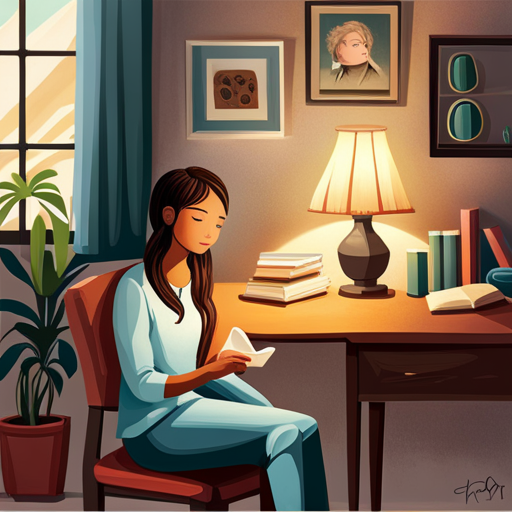"Cherishing Little Steps - A Haven for Baby and Family Journeys"
Dealing With Teen Anxiety
Are you aware that approximately 1 in 3 teenagers experience symptoms of anxiety? Dealing with teen anxiety can feel overwhelming, but you’re not alone. In this guide, we’ll explore the various aspects of teen anxiety and provide you with practical strategies to help navigate through it.
Understanding the causes and symptoms of anxiety is the first step towards finding relief. We’ll also address how social media impacts teen anxiety and offer effective coping mechanisms tailored specifically for teens.
Balancing school and extracurricular activities can be challenging, but we’ll show you how to manage your time and reduce stress. Remember, seeking professional help is a sign of strength, and we’ll discuss when and how to do so.
Together, we can overcome the stigma surrounding teen anxiety and find the support needed for long-term management.
Key Takeaways
- Teen anxiety can be caused by various factors such as academic pressure, social challenges, family conflict, and unrealistic expectations.
- It is important to recognize the symptoms of teen anxiety, including excessive worry, restlessness, difficulty concentrating, and physical symptoms like headaches and stomachaches.
- Effective coping mechanisms for teen anxiety include journaling, mindfulness and relaxation techniques, regular exercise, and building a strong support system.
- Parents play a crucial role in managing teen anxiety by considering therapy, communicating with teachers, creating a safe and supportive environment, and providing unconditional support.
Understanding Teen Anxiety

To understand teen anxiety, you must grasp the underlying causes and symptoms that affect young individuals. Recognizing triggers is an essential step in helping teens manage their anxiety. Triggers can range from social situations to academic pressures. It’s crucial to create a safe and supportive environment where teens feel comfortable discussing their triggers. Encourage open and honest communication, and let them know that seeking therapy is a valid and effective option.
Therapy can be incredibly beneficial for teens dealing with anxiety. A licensed therapist can provide them with the tools and strategies to cope with their anxiety symptoms. Cognitive-behavioral therapy (CBT) is often used to help teens identify and challenge negative thought patterns that contribute to their anxiety. Additionally, therapy can help teens develop healthy coping mechanisms and build resilience.
When seeking therapy for your teen, it’s important to find a therapist who specializes in working with adolescents and has experience treating anxiety disorders. Look for someone who creates a safe and non-judgmental space for your teen to discuss their fears and worries. Remember that therapy is a collaborative process, and your teen should feel comfortable and supported throughout their therapeutic journey.
Recognizing the Symptoms

Recognize the symptoms of teen anxiety. It’s important to be able to identify the signs of anxiety in teenagers, as recognizing them early can lead to seeking help and support. Teenagers often experience a range of emotions, but when anxiety becomes persistent and interferes with their daily lives, it may indicate a larger issue.
Some common symptoms of teen anxiety include excessive worry or fear, restlessness, irritability, difficulty concentrating, and trouble sleeping. Physical symptoms such as headaches, stomachaches, and muscle tension may also be present. Additionally, teens with anxiety may avoid certain situations or activities that trigger their anxiety, experience panic attacks, or have an overwhelming sense of fear or dread.
Recognizing these symptoms is crucial in order to provide the necessary support and intervention. If you notice your teenager exhibiting these signs, it’s important to encourage open communication and offer reassurance. Seeking help from a mental health professional, such as a therapist or counselor, can also be beneficial. They can assist in providing strategies to manage anxiety and offer a safe space for your teenager to express their concerns.
Common Causes of Teen Anxiety

Identifying the common triggers of teen anxiety can help you understand the underlying causes and provide effective support.
Adolescence can be a challenging time, and it’s important to recognize the factors that may contribute to your anxiety. Here are some common causes of teen anxiety:
-
Academic pressure: The demands of school, such as exams and assignments, can create stress and anxiety. It’s important to find healthy ways to manage academic pressure and seek support when needed.
-
Social challenges: Navigating friendships, peer pressure, and social expectations can be overwhelming. Feeling judged or excluded can trigger anxiety. Building a strong support system and practicing effective communication skills can help manage social stress.
-
Family dynamics: Conflict or instability within the family can contribute to anxiety. It’s crucial to foster open and honest communication with your family members and seek professional help if needed.
-
Life transitions: Major life changes like moving to a new school, starting college, or experiencing a significant loss can cause anxiety. Developing coping strategies and seeking support can help ease the stress associated with these transitions.
Understanding these triggers and managing stress can empower you to navigate through the challenges of adolescence.
Impact of Social Media on Teen Anxiety

Social media can significantly contribute to teen anxiety. In today’s digital age, where social media platforms dominate the lives of teenagers, it is crucial to understand the negative effects they can have on mental health. One of the main factors contributing to teen anxiety is the comparison culture fostered by social media. As teens scroll through their feeds, they are bombarded with carefully curated images and posts that often depict an unrealistic and idealized version of life. This constant exposure to the seemingly perfect lives of others can lead to feelings of inadequacy, low self-esteem, and anxiety.
To illustrate the impact of social media on teen anxiety, consider the following table:
| Negative Effects of Social Media on Teen Anxiety | Comparison Culture |
|---|---|
| Creates unrealistic expectations | Amplifies feelings of inadequacy |
| Promotes constant comparison | Diminishes self-esteem |
| Fosters fear of missing out (FOMO) | Increases anxiety levels |
| Facilitates cyberbullying | Exacerbates social anxiety |
| Reduces face-to-face social interactions | Isolates individuals |
It is important to recognize that social media is not inherently bad, but rather the way it is used and consumed can have detrimental effects on teen mental health. By being aware of the negative impact of comparison culture and taking steps to limit exposure and promote a healthy relationship with social media, we can help alleviate teen anxiety in the digital age.
Effective Coping Mechanisms for Teens

To effectively cope with teen anxiety, it’s important for you to regularly practice self-care strategies. Here are some effective coping mechanisms and stress management techniques that can help you navigate through your anxiety:
-
Deep Breathing: Taking slow, deep breaths can help calm your nervous system and reduce anxiety symptoms. Try inhaling deeply through your nose, holding the breath for a few seconds, and then exhaling slowly through your mouth.
-
Mindfulness and Meditation: Engaging in mindfulness exercises or meditation can help you stay present and cultivate a sense of calm. Focusing on the present moment can help alleviate anxious thoughts and promote relaxation.
-
Physical Exercise: Engaging in regular physical exercise can have a positive impact on your mental health. Exercise releases endorphins, which are natural mood boosters. Find an activity that you enjoy, whether it’s dancing, hiking, or playing a sport, and make it a regular part of your routine.
-
Seeking Support: Don’t hesitate to reach out to trusted adults, friends, or professionals for support. Talking about your feelings and concerns can provide relief and help you gain perspective.
Building a Supportive Network

When building a supportive network, it is important to reach out to those who can provide understanding and encouragement during times of teen anxiety. Supportive friends can play a crucial role in helping teenagers navigate the challenges of anxiety. These friends are the ones who listen without judgment, offer a shoulder to lean on, and provide a sense of belonging. They can be a source of comfort and reassurance, reminding teens that they are not alone in their struggles.
In addition to supportive friends, therapy options can also be a valuable part of a teen’s support network. Therapy provides a safe space for teens to express their feelings, explore coping strategies, and develop a better understanding of their anxiety. There are various therapy options available, including individual therapy, group therapy, and family therapy. Each option offers unique benefits and can be tailored to meet the specific needs of the teenager.
To help you better understand the different therapy options, here is a table outlining their key features:
| Therapy Option | Key Features |
|---|---|
| Individual Therapy | One-on-one sessions with a therapist to address specific concerns and develop coping skills. |
| Group Therapy | Sessions with a small group of peers facing similar challenges, providing a sense of community and shared support. |
| Family Therapy | Involves the entire family, focusing on improving communication, resolving conflicts, and strengthening relationships. |
The Role of Parents in Managing Teen Anxiety

As a parent, you play a crucial role in managing your teenager’s anxiety. It’s important to remember that anxiety is a common experience for many teenagers, and your support can make a significant difference in helping them navigate through it.
Here are some key ways you can help your teenager manage their anxiety:
-
Role of therapy: Consider seeking professional help for your teenager. Therapy can provide them with the necessary tools and strategies to cope with their anxiety. A therapist can also offer guidance and support to both you and your teenager as you navigate this journey together.
-
Communication with teachers: Establish open lines of communication with your teenager’s teachers. They can provide valuable insights into your teenager’s behavior and academic performance, which can help you better understand and address their anxiety. Collaborating with teachers can also ensure that your teenager receives any necessary accommodations or support in the school environment.
-
Create a safe and supportive environment: Foster an open and non-judgmental atmosphere at home. Encourage your teenager to express their feelings and concerns, and validate their experiences. Let them know that you’re there to listen and support them unconditionally.
-
Encourage self-care: Help your teenager prioritize self-care activities that promote relaxation and stress reduction. Encourage them to engage in activities they enjoy, such as hobbies, exercise, or spending time with friends. Teaching them healthy coping mechanisms can empower them to manage their anxiety effectively.
Creating a Healthy Lifestyle

Maintaining a balanced and active routine is essential for teenagers in managing their anxiety. Promoting self-care and encouraging open communication are two key aspects of creating a healthy lifestyle.
When it comes to self-care, it’s important to prioritize activities that help you relax and recharge. This could include activities like taking up a hobby, spending time in nature, or practicing mindfulness and meditation. By engaging in these activities, you can reduce stress levels and improve your overall well-being.
In addition to self-care, open communication plays a crucial role in managing anxiety. It’s important to have a support system that you can rely on when you’re feeling overwhelmed. This could be your parents, friends, or even a therapist. By sharing your thoughts and feelings with others, you can gain different perspectives and receive the support and reassurance you need.
Creating a healthy lifestyle also involves maintaining a balanced diet and getting regular exercise. Eating nutritious foods and staying physically active can have a positive impact on your mental health. Exercise releases endorphins, which are known as the ‘feel-good’ hormones, and can help alleviate symptoms of anxiety.
Balancing School and Extracurricular Activities

Finding a balance between school and extracurricular activities can be challenging, but it’s crucial for managing teen anxiety. As a teenager, you may feel overwhelmed by school pressures while also wanting to participate in activities that you enjoy. Here are some tips to help you balance school and extracurricular activities effectively:
-
Prioritize: Identify your most important commitments and prioritize them. This will help you allocate your time and energy accordingly.
-
Create a schedule: Develop a schedule that includes both schoolwork and extracurricular activities. Having a visual representation of your time can help you manage it more efficiently.
-
Practice time management: Learn to manage your time effectively by setting realistic goals and deadlines. Break tasks into smaller, manageable chunks to avoid feeling overwhelmed.
-
Communicate: Openly communicate with your teachers, coaches, and parents about your commitments. They can provide support and help you find ways to balance your responsibilities.
Seeking Professional Help: When and How

To effectively address teen anxiety, it is important to understand when and how to seek professional help. Recognizing the signs that your teenager may benefit from therapy is crucial. If your teen is experiencing persistent feelings of sadness or hopelessness, withdrawing from activities they once enjoyed, or struggling to concentrate in school, it may be time to consider therapy. Other indicators include changes in sleep patterns, appetite, or social relationships. Seeking therapy earlier rather than later can prevent anxiety from escalating and interfering with your teen’s overall well-being.
Finding the right therapist for your teenager is essential. Start by asking for recommendations from your child’s pediatrician, school counselor, or trusted friends and family. When choosing a therapist, consider their experience working with teenagers, their approach to therapy, and their availability. It’s also important to find a therapist with whom your teenager feels comfortable and can build a strong rapport.
To help you in your search, here is a table summarizing important factors to consider when seeking therapy for your teen:
| Factors to Consider | Questions to Ask |
|---|---|
| Experience working with teenagers | Have you worked with teenagers before? |
| Therapy approach | What is your therapeutic approach? |
| Availability | What are your office hours and scheduling options? |
Overcoming Stigma and Seeking Support

One way to overcome stigma and seek support for your teenager’s anxiety is by educating yourself and others about mental health. Understanding the nature of anxiety disorders can help dispel misconceptions and reduce the stigma surrounding them.
Here are some steps you can take to overcome stigma and seek the support your teenager needs:
-
Challenge stereotypes: Educate yourself and others about the realities of mental health. Share accurate information and challenge the stereotypes and misconceptions that contribute to stigma.
-
Promote open communication: Encourage open conversations about mental health within your family and social circles. By fostering a supportive environment, your teenager will feel more comfortable seeking help and sharing their experiences.
-
Seek professional guidance: Reach out to mental health professionals who specialize in working with teenagers. They can provide valuable guidance and support tailored to your teenager’s needs.
-
Connect with support networks: Look for local or online support groups specifically for parents or caregivers of teenagers with anxiety. These communities can provide a safe space for you to share your experiences, seek advice, and connect with others who understand what you’re going through.
Long-Term Strategies for Managing Teen Anxiety

To effectively manage your teenager’s anxiety over the long term, it is important to establish consistent self-care practices and provide ongoing support. While seeking professional help and therapy is crucial, there are also various self-care techniques that can be incorporated into your teenager’s daily routine to help them manage their anxiety more effectively.
One effective therapy option for managing teen anxiety is Cognitive Behavioral Therapy (CBT). This type of therapy helps individuals identify and change negative thought patterns and behaviors that contribute to their anxiety. It equips them with tools and strategies to challenge and reframe anxious thoughts, leading to a reduction in anxiety symptoms over time.
In addition to therapy, self-care practices play a vital role in managing teen anxiety. Encouraging your teenager to engage in activities they enjoy and find relaxing can help them cope with anxiety in the long run. Regular exercise, mindfulness and deep breathing exercises, and maintaining a healthy sleep routine are all effective self-care techniques that can help reduce anxiety symptoms.
The following table provides examples of self-care techniques that your teenager can incorporate into their daily routine:
| Self-Care Technique | Description | Benefits |
|---|---|---|
| Regular Exercise | Engaging in physical activities such as walking, jogging, or dancing | Releases endorphins, improves mood, reduces stress |
| Mindfulness | Practicing present-moment awareness and acceptance | Reduces anxiety, improves focus and overall well-being |
| Healthy Sleep Routine | Establishing a consistent sleep schedule and practicing good sleep hygiene | Enhances mood, improves cognitive function, reduces anxiety |
Frequently Asked Questions
How Can I Differentiate Between Normal Teenage Stress and Anxiety?
It can be tough to tell the difference between normal stress and anxiety in teenagers. Look out for signs like excessive worry, physical symptoms, and avoidance behaviors. If you’re unsure, it’s always a good idea to seek professional help.
Is It Possible for a Teenager to Outgrow Their Anxiety?
Can a teenager outgrow their anxiety? It’s a question many parents and teens wonder about. While some teenagers may see improvement with age, for others, anxiety can be a lifelong struggle.
Can Social Media Actually Be Beneficial for Teenagers With Anxiety?
Social media can have a positive impact on teen anxiety, as it allows them to connect with others who may be experiencing similar struggles. Exploring the connection between social media use and mental health in teenagers is important.
Are There Any Natural Remedies or Alternative Therapies That Can Help Manage Teen Anxiety?
There are natural remedies and alternative therapies that can help manage teen anxiety. Some options include relaxation techniques, such as deep breathing and meditation, as well as herbal supplements like lavender and chamomile. It’s important to find what works best for you.
What Are Some Common Misconceptions About Teen Anxiety That Need to Be Debunked?
You may have heard some false ideas about teen anxiety. Let’s set the record straight and debunk those misconceptions. Also, remember that parental support plays a crucial role in managing teen anxiety.
Conclusion
In conclusion, dealing with teen anxiety can be challenging, but there are effective coping mechanisms and strategies available.
Just like a sturdy life jacket helps you navigate rough waters, seeking support and professional help can provide the necessary tools to manage anxiety.
Remember, you’re not alone in this journey, and with the right guidance, you can overcome the waves of anxiety and thrive.



yandanxvurulmus.qUyFDSfLVQZV
xbunedirloooo.i06qqzYpa1y9
fuckings xyandanxvurulmus.jwR9WHgbNwjQ
best non prescription allergy medication allergy medication without side effects best allergy medications over the counter
sleeping prescription sleeping pills online buy provigil for sale
deltasone 20mg ca buy deltasone 5mg sale
best antacid over the counter order cefadroxil 250mg pill
acnomel adult acne medication genital prednisone 20mg cost expensive acne medication
prescription only allergy medication purchase desloratadine for sale best antihistamine decongestant combo
buy isotretinoin 20mg online cheap buy isotretinoin pills absorica online
amciik siteleri vurgunyedim.zEJQIIAUUpXb
sektor benim zaten amin evladi yaralandinmieycan.1EofEfo83BOs
cheap amoxicillin 250mg amoxicillin canada amoxicillin cost
prescription sleep medication online buy melatonin medication
azithromycin 500mg without prescription buy azithromycin cheap zithromax where to buy
buy neurontin without a prescription cheap gabapentin pills
amciik siteleri citixx.8Af5L9gsKDpO
anal sikis siteleri hyuqgzhqt.zfAlOyaIU6kw
watch porn video ewrjghsdfaa.mizVBXcNdMj6
anal siteleri wrtgdfgdfgdqq.ai2vHIUwVk78
bahis porno wrtgdfgdfgdqq.xA6LecGUz4iU
buy cheap generic azithromycin order azipro 250mg generic azithromycin online buy
buy generic furosemide diuretic order furosemide pills
prednisolone 10mg oral generic omnacortil 5mg buy prednisolone 20mg online
amoxicillin 1000mg sale amoxicillin 1000mg drug buy amoxil tablets
buy monodox generic purchase monodox
albuterol order order albuterol generic order ventolin generic
cost augmentin purchase augmentin online
levothyroxine online order synthroid tablets synthroid 75mcg pill
vardenafil 10mg cost order vardenafil pill
buy clomiphene 50mg without prescription clomiphene order order clomid 100mg pills
tizanidine for sale online tizanidine 2mg pills buy tizanidine 2mg without prescription
order rybelsus 14 mg sale where can i buy rybelsus semaglutide where to buy
deltasone 5mg sale purchase prednisone online cheap buy prednisone 40mg online cheap
buy generic rybelsus buy generic rybelsus for sale semaglutide 14mg sale
cost accutane 20mg accutane 40mg oral accutane 40mg ca
amciik siteleri hepxhupx.94KfoehYuCWd
bahis siteleri incest category juljulfbi.cpMESzVyB1zt
buy generic ventolin for sale albuterol buy online cheap ventolin 2mg
buy amoxil paypal amoxicillin 1000mg over the counter amoxil price
sexx bjluajszz.jS97UVSzgbwx
eski rahatiniz olmayacak bxjluajsxzz.PtCdmFUZw5LD
fuck 0qbxjluaxcxjsxzz.n87Q4DbOh6v5
purchase azithromycin online buy zithromax generic order zithromax for sale
order synthroid pill synthroid 75mcg without prescription oral synthroid 75mcg
buy prednisolone 40mg online prednisolone 40mg drug cost omnacortil 10mg
serophene price order clomiphene 100mg without prescription buy cheap clomid
buy gabapentin 600mg generic neurontin order online order gabapentin 800mg for sale
sildenafil 50mg price viagra sildenafil 50mg free shipping viagra
lasix 100mg uk order furosemide 100mg sale order furosemide 100mg online
rybelsus 14 mg cost rybelsus 14 mg for sale semaglutide where to buy
doxycycline drug purchase doxycycline generic doxycycline canada
levitra online order brand levitra 10mg order levitra 20mg online cheap
legal online blackjack free casino slots casino arizona
plaquenil 400mg oral plaquenil us plaquenil 400mg price
aristocort cost triamcinolone online buy aristocort online cheap
buy cialis online cheap cheap generic cialis cialis 5mg tablet
clarinex 5mg drug buy clarinex tablets cost clarinex 5mg
purchase cenforce sale cenforce 100mg us oral cenforce
purchase chloroquine generic chloroquine price order chloroquine pill
loratadine 10mg pills purchase loratadine online loratadine order
seksi siteler pokkerx.OycHyBgn7JxW
sexax 250tldenemebonusuxx.mHgk6o4bkhde
seksi siteler eyeconartxx.OYhGAOoIjZG5
buy xenical 120mg without prescription orlistat ca diltiazem medication
craft porn vvsetohimalxxvc.4uTVFnj1MEwL
lipitor pills lipitor 10mg oral buy atorvastatin without prescription
acyclovir 400mg cheap order zyloprim 100mg order allopurinol 300mg pill
buy zestril pills buy generic lisinopril 10mg prinivil online buy
rosuvastatin 20mg price buy crestor online buy zetia 10mg for sale
buy omeprazole 10mg pills buy prilosec 10mg generic prilosec drug
purchase motilium generic buy domperidone 10mg generic order sumycin 250mg online cheap
metoprolol 50mg cost metoprolol 50mg canada lopressor 50mg sale
cyclobenzaprine buy online order cyclobenzaprine 15mg pill baclofen 10mg tablet
buy tenormin 100mg generic buy tenormin online tenormin 50mg usa
toradol 10mg drug colchicine usa order colcrys 0.5mg generic
sex 4k videos gghkyogg.9bmE5BFFiPt
porn hd 4k download ggjennifegg.SauED01STVh
4k porn videos free download ggjinnysflogg.6eEaFxdDfeX
fashionflag best free hd porn site fashionflag.YS1h5xSva7F
रूसी अश्लीलता के बारे में बतावल गइल बा hjkvbasdfzxzz.pFPg1uWMAxy
लड़की हस्तमैथुन अश्लील txechdyzxca.59vGWoRdOR8
नकली टैक्सी अश्लील hkyonet.B568TlIUsEF
ਏਸ਼ੀਆਈ ਪੋਰਨ madisonivysex.RgsLPM3u95a
ladesbet ਮਿਸ਼ਨਰੀ ਸ਼ੈਲੀ ਪੋਰਨ ladesinemi.CS7bxCsACsF
ladesbet 熟女 (40 ) ポルノ ladestinemi.kWHi8M90NXq